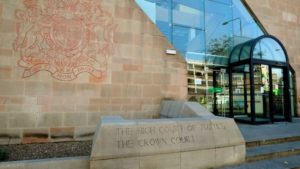Senior Crown Court Litigator Laura Clarson recently worked with Nick Jones, a barrister from 5 St Andrew’s Hill Chambers, at Nottingham Crown Court to secure an acquittal for her client.
Serious Violent Offence at Nottingham Crown Court
Laura’s client was charged with another accused of causing grievous bodily harm with intent. The allegation was that the complainant had been assaulted with a weapon, probably a bat, as a result of his unwanted attentions in relation to our client’s mother.
The injuries involved fractures to the complainant’s face. Blood had been lost by the complainant. It was the prosecution’s contention that this blood evidence could make a jury sure that Laura’s client had been one of those who took part in the attack.
A favourable outcome to the case was extremely important to her client, not least because the Sentencing Guidelines for this offence suggested that if convicted he could expect to receive a sentence that would start at 6 years in prison.
The case required careful preparation. The witness had no recollection of the incident which led to his injuries. They were of such severity, however, that he must have been subject to a serious assault. Although Laura’s client was now asserting that he had not taken part in the assault, he had not told the truth to the police during the early stages of the investigation.
Expert Evidence
The Crown maintained that it’s expert analysis of the blood evidence was decisive and claimed that if would offer the jury no alternative but to conclude that Laura’s client had been involved.
As soon as the blood evidence was disclosed, Laura instructed a respected expert, Gillian Leak of Principal Forensic Service to provide a report on behalf of her client.
Despite early service of these conclusions and the seniority and experience of our expert the Crown proved intransigent in relation to the case. There was resistance to an early conference between experts to find points of common ground. It transpired during the course of these negotiations that the Crown expert had not been given the entirety of the Crown case in order to further review his findings.
Although it was clear to Laura in March 2016 that the Crown’s view of the blood evidence would be unsustainable at trial, the prosecution continued nonetheless. Problems in the complainant’s case were highlighted during cross-examination. Most importantly, the Crown expert conceded many points in our client’s favour during questioning.
 Belatedly, the Crown saw reason dropped the case against Laura’s client half way through the trial at Nottingham Crown Court and he was found not guilty. This was six months after Laura had served the evidence and made representations about the wisdom of the prosecution.
Belatedly, the Crown saw reason dropped the case against Laura’s client half way through the trial at Nottingham Crown Court and he was found not guilty. This was six months after Laura had served the evidence and made representations about the wisdom of the prosecution.
Contact Us
Crown Court cases are often complicated and steps will need to be taken to challenge what at first glance appears to be conclusive evidence. Please contact Laura if you have a case before Nottingham Crown Court on 0115 9599550 or email her here. Alternatively, find your closest office here.



